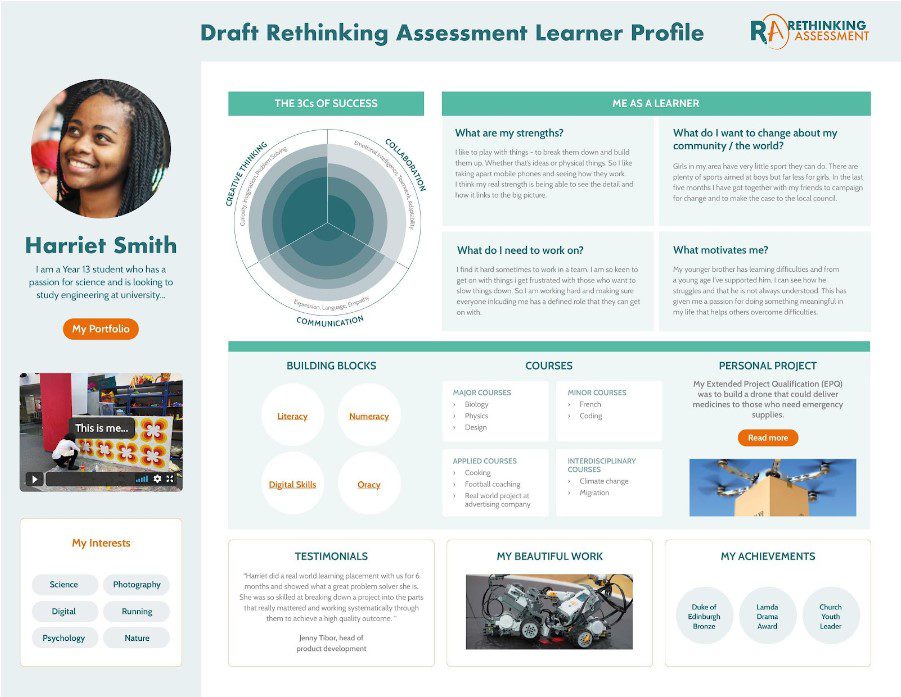DR FRAN WILBY, RETHINKING ASSESSMENT, UK
Internationally, there has been some challenge in recent years to the efficacy of exams as the sole measure of a young person’s life and work readiness. In some regions, learner profiles are garnering particular interest as an alternative. Student-owned digital records may offer an opportunity to highlight learning, strengths and evidence across a spectrum of areas of achievement and provide a richer view of capabilities, enabling learners to better understand themselves, while broadening how and what is assessed – and valued – in formal education.
In England, many have argued that the current assessment system is no longer fit for purpose. Only 43 per cent of disadvantaged children reached age-related expectations at Key Stage 2 (DfEDepartment for Education - a ministerial department responsible for children’s services and education in England, 2023a). Many young people ‘leave compulsory education without high quality qualifications’ – in 2022, nearly 20 per cent did not achieve L2 by the age of 19 (DfE, 2023b, p. 12). About one in five children and young people aged eight to 25 years have a probable mental disorder (NHS Digital, 2023), with many young people feeling ‘that the education system focuses too heavily on academic achievement, to an extent that can be detrimental for their mental health’ (Young Minds, 2023, p. 11).
In 2023, a larger proportion of children and young people scored below the midpoint for school (14.5%) than for the other nine aspects of life included in The Children’s Society’s Good Childhood Index, indicating that that is the aspect of life that more children are unhappy about.
(Children’s Society, 2023, p. 60)
More widely, it has been suggested that businesses seek a rounded school-leaver profile, with 89 per cent of employers stating that students should be assessed on more than academic attainment (The Times, 2022).
As inequalities across our education system deepen, the case for considering alternatives is growing. Reports from the Times Education Commission (The Times, 2022), the All Party Parliamentary Group for Schools, Learning and Assessment (Burgess, 2023) and the House of Lords Education for 11–16 Year Olds Committee (House of Lords, 2023) all cite the potential of learner profiles. In 2022, Rethinking Assessment – a non partisan coalition of school leaders from across the state and independent sectors, alongside leading researchers, key policy-makers, employers and higher education representatives, seeking to broaden and modernise assessment – launched a conceptual framework and has since co-developed and piloted workable models with primary, secondary and special educational needs settings, schools and colleges. In light of these debates, this case study will outline the potential use of learner profiles as a tool for enabling a broader and more balanced method of evidencing learning, development and achievement.
Global perspectives and trends
Globally, interest in learner profiles has emerged from the growing recognition that exam-centric assessment may fail to capture learners’ full breadth of strengths and that, in order to prepare young people to navigate an uncertain future, assessment should be more personalised and inclusive. This rebalancing of the system can be seen across many jurisdictions, demonstrating that capturing and evidencing strengths (such as creativity and collaborative problem-solving (Taylor et al., 2020)) is essential for preparing learners to thrive.
While learner profiles are adapted to specific contexts, research shows some common trends. The World Economic Forum (2016) emphasises foundational literacies, competencies and character qualities, while the International Baccalaureate (2023) learner profile extends beyond academic success to encompass diverse human capacities and responsibilities. Elsewhere, the US-based Mastery Transcript Consortium is ‘empowering students to showcase competencies and share evidence of their learning’ (nd).
Whilst they have not been without controversy, in Australia, learner profiles are now state-level policy, and there is a focus on reforming assessment to better prepare upper secondary school students for learning, work and life (Lucas, 2023). Since 2014, Finnish schools have integrated traditional subjects with cross-cutting skills, including a mandatory annual interdisciplinary module (Lucas, 2023). Learner profiles are also making headway in Wales and Scotland (Scottish Government, 2023).
Developing a learner profile framework in the UK
Drawing on international research and evidence, Rethinking Assessment developed a framework of components (see Figure 1) that balance metacognition, self-reflection and development of applied skills with academic rigour and qualifications, in a manner recognised by education institutions, employers and parents (House of Lords, 2023).

Figure 1: Draft Rethinking Assessment learner profile
Rethinking Assessment’s learner profile framework (Figure 1) encompasses:
- Me as a learner: A reflective statement, drawing on metacognition research and adapted for age-appropriateness
- Foundational literacies: Including numeracy, literacy, oracy and digital skills
- Subjects, courses and areas of learning: Courses that bridge academic/vocational learning, including subject-based, interdisciplinary and practical learning; these may include formal qualifications
- The ‘3Cs’ skills and dispositions: Collaboration, communication/oracy and creative thinking; these may focus on one or multiple skills/attributes
- Personal project: Achievement of project qualifications, e.g. Foundation (FPQ), Higher Project Qualification (HPQ), Extended Project Qualification (EPQ) or Active Citizenship Award.
- Passions, interests, careers and workplace experiences: Including digital badges, extracurricular activities, Duke of Edinburgh Award, music, sports, coaching, caring and work experience (Rethinking Assessment, 2023).
Each component contains multimodal evidence of learning – oral, written and audiovisual artefacts, curated digital portfolios, testimonials and student reflections on their learning. Achievements may also be accredited through formal qualifications, awards or micro-credentials (including existing project qualifications such as HPQ/EPQ), or verified by trusted professional bodies, employers and HE institutions.
Crucially, to make assessment more equitable, learner profiles must be accessible to all learners (Macfarlane, 2021), with access to a variety of learning experiences, inside and outside of formal education, and inclusive assessment methods that accommodate factors such as neurodiversity.
Insights from learner profile pilots in England
Our initial findings suggest that learner profiles can be a lever with which to unlock changes to curriculum and assessment in schools, encouraging and enabling teachers and leaders to teach and evidence skills and dispositions alongside academic achievement. Learner profiles have impacted classroom practice by encouraging pedagogical innovation and increasing teacher confidence in multimodal methods of assessment, enabling more equitable methods of evidencing student achievement and experience (Rethinking Assessment, 2023).
Additionally, we have found multiple entry points within the existing curriculum for implementing learner profiles (Palmer 2024; Sheldrake 2023). For example:
- as a tool to support transitions between phases of education
- to support careers education or PSHE
- as a way to rethink reporting systems – for example, parent/carer reports.
However, school cultural readiness varies, as does technical literacy. Curriculum integration of learner profiles is essential, supported by high-quality professional development for teachers. Crucially, learner profiles should be seen as a pedagogy and an ongoing process of learning, emphasising student reflection (many schools are exploring the ‘me as a learner’ component in the profile), with coaching and mentoring as essential practices.
The pilots have also uncovered technical considerations, including equity of access to technology, devices and broadband connectivity. Existing technological tools, such as Google/Microsoft software, already prevalent in many schools, can be a good starting point for digital learner profile creation, capturing previously ‘unrecognised’ student skills and lightening teacher workload (Rethinking Assessment, 2023).
Conclusions
Rethinking Assessment’s learner profile framework aims to balance academic rigour and applied skills, while promoting inclusivity. Mental health and wellbeing, our deepening understanding of teenage brain development and neurodiversity, and entrenched structural inequality are driving this imperative. Multimodal assessment techniques can contribute to a more nuanced understanding of student capabilities and potential, rebalancing the focus in formal education. Early insights highlight school readiness, technical requirements and the need for professional development as essential considerations for effective implementation.
As we strive for more equitable approaches, Rethinking Assessment is actively developing new resources and expanding its learner profile starter kit (https://rethinkingassessment.com/learner-profile). Drawing inspiration from Scotland’s co-design group and Professor Louise Haywood’s recommendations (Scottish Government, 2023), plus the plethora of reports recommending a learner profile for England, there is hope that we can take advantage of the changing discourse around broader qualification reform in order to implement learner profiles more widely.











